Ebertfest Spot... for Rog from Michael Mirasol on Vimeo
A selection of tributes and memories from those who knew, and read, Roger Ebert. More will be added as we collect them:
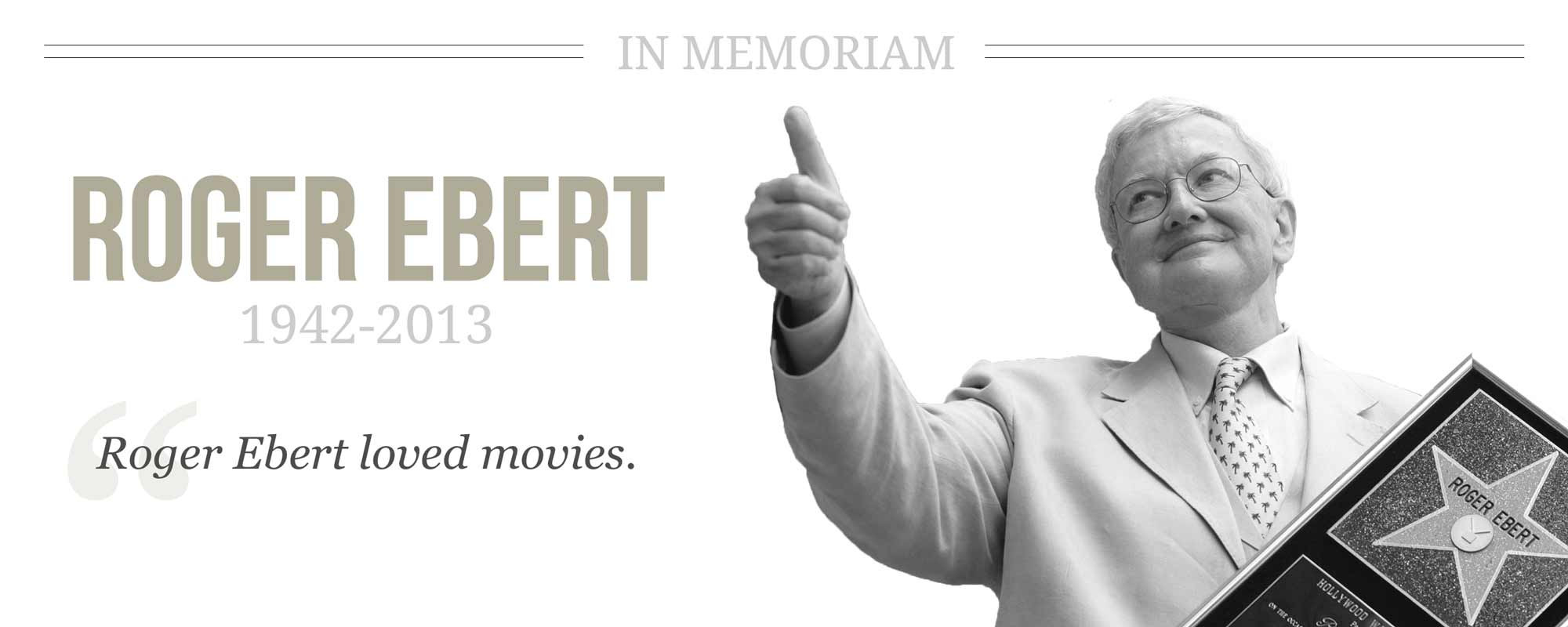
Ebertfest Spot... for Rog from Michael Mirasol on Vimeo
A selection of tributes and memories from those who knew, and read, Roger Ebert. More will be added as we collect them:
“For a generation of Americans — and especially Chicagoans — Roger was the movies. When he didn’t like a film, he was honest; when he did, he was effusive — capturing the unique power of the movies to take us somewhere magical.
“Even amidst his own battles with cancer, Roger was as productive as he was resilient — continuing to share his passion and perspective with the world. The movies won’t be the same without Roger, and our thoughts and prayers are with Chaz and the rest of the Ebert family.”
Roger’s customary seat at the Lake Street Screening Room, before a press screening of Terence Malick’s “To the Wonder,” the morning of April 5, 2013:

(photo by Bill Stamets)
“Though he was viewed as a movie critic with the soul of a poet, he also had killer business instincts. A journalist since the 1960s, he not only survived endless tumult in the craft, he thrived by embracing new opportunity and expanding his franchise at every turn.
“Just as Jay-Z is more than a musician, Roger Ebert was much more than a guy who wrote about movies. He was a newspaper writer, a television personality, a public speaker, a book author, an event impresario and a Web publisher. And through his Web site, RogerEbert.com, he is still with us even though he is gone, demonstrating the kind of stickiness and durability that media brands crave.”
— David Carr, New York Times
“There will be a long, long echo [of his work] reverberating for a long, long time… I’ve always tried to be a good soldier of cinema myself, so of course since he’s gone, I will plow on, as I have plowed on all my life, but I will do what I have to do as if Roger was looking over my shoulder. And I am not gonna disappoint him.”
— Werner Herzog, EW.com
“‘I was born inside the movie of my life’: the opening words of [his memoir] ‘Life Itself’ announce both the crucial cinematic lure of magic images on a big screen and Roger’s talent for analyzing his own adventures and limitations. Given his gift of gab, that movie must have been a talkie. He fits William F. Buckley Jr.’s description of Roger’s fellow Midwesterner Rush Limbaugh: ‘preternaturally fluent.’ One imagines him popping out of the womb and saying, ‘Hi, Mom! Well, that was an interesting nine-month movie I just sat through. The visuals were lacking; it was more like radio, really. But the soothing darkness well prepared me for a life of sitting in movie theaters. All in all, I give the experience two enthusiastic, tiny thumbs up!’”
— Richard Corliss, TIME
“Virtually alone among his generation of journalists, Ebert saw the substantive potential of social media early on and translated his fame in print and on TV to the Internet, becoming a Twitter trailblazer and a mentor who showed the rest of us in this imploding profession not just how to survive but how to prosper in the digital age. […]
“He’s up there with Will Rogers, H.L. Mencken and A.J. Liebling, and not too far short of Mark Twain, as one of the great plainspoken commentators on American culture and American life. What was so wonderful about Roger as a critic was the fact that he was never a snob and never condescended to anyone, while also being an immensely knowledgeable student of film who avoided the faux-populist reverse snobbery of so many of the critics who followed him into television. He wrote in clear, declarative newspaper prose aimed first and foremost at his Chicagoland readership — ‘I go into the movie, I watch it, and I ask myself what happened to me’ — but was just as likely to lavish praise on foreign films or tiny indies or cheesy exploitation flicks as on Hollywood star packages.”
— Andrew O'Hehir, Salon.com
“If there was any downside to [Siskel and Ebert’s] television success, it was that so many people only knew them from that medium and never sought out their printed reviews. I was one of those people. It was only with the invention of the Internet that I began reading Roger’s reviews, on his comprehensive website, and marveling at his writing skill. He is the only critic I know who unashamedly drew on his life experiences to explain his feelings about a given movie. It wasn’t a gimmick, and it never made him seem self-absorbed, just disarmingly candid.”
— Leonard Maltin, Indiewire
“CHICAGO—Calling the overall human experience ‘poignant,’ ‘thought-provoking,’ and a ‘complete tour de force,’ film critic Roger Ebert praised existence Thursday as ‘an audacious and thrilling triumph.’ ‘While not without its flaws, life, from birth to death, is a masterwork, and an uplifting journey that both touches the heart and challenges the mind,’ said Ebert, adding that while the totality of all humankind is sometimes ‘a mess in places,’ it strives to be a magnum opus and, according to Ebert, largely succeeds at this goal.”
— Kevin B. Lee's Press Play video tribute to Roger’s Sight & Sound Critics Poll selections. Recorded at Ebertfest 2012 and featuring the voices of contributors to the Far-Flung Correspondents and The Demanders
“He saw, and felt, and described the movies more effectively, more cinematically, and more warmly than just about anyone writing about anything. Even his pans had a warmth to them. Even when you disagreed with Roger you found yourself imagining the movie he saw, and loved (or hated) more than you did.
“I came late to film criticism in Chicago, after writing about the theater. Roger loved the theater. His was a theatrical personality: a raconteur, a spinner of dinner-table stories, a man who was not shy about his accomplishments. But he made room in that theatrical, improbable, outsized life for others.”
— Michael Phillips, Chicago Tribune
“Ebert enjoyed his status as the world’s most famous film critic but did not believe it was fully deserved. When I wrote an article calling him the finest film critic we will ever see, he sent me an email telling me off. ‘I am not the best film critic in the world,’ he wrote. ‘Though I might be the hardest-working.’ He was right on the second count and wrong on the first.
“His rules for writing were simple and obvious to anyone who knew him: never be dull, never be dishonest and never miss a deadline. This is what he taught me about film criticism and this is what he taught me about life.”
— Scott Jordan Harris, Far-Flung Correspondent, The Telegraph
“I grew up in Kansas City and Dallas in the seventies and eighties. To put it mildly, these were not film towns. They had precious few art-house theaters. Roger Ebert’s review show with Gene Siskel, which ran on PBS and then in syndication under various titles, was my gateway into cinematic worlds I might not have otherwise explored, and that road led to my becoming a film and TV critic. Siskel and Ebert had as much to do with stoking my interest in films and film criticism as anyone I knew personally. Maybe more.”
— Matt Zoller Seitz, Vulture.com
“Fast-forward to my adolescent years. Roger and Gene (in color) were on Channel 11, the same channel that satiated my love of Abbott and Costello, Douglas Sirk and Yankees baseball. Roger had also become syndicated in the New York newspaper, so I could finally partake of his prose. It read as if he were in the room with me, having a conversation. Roger Ebert was educating me about foreign films, arty-fartsy fare and blockbusters. But he was also telling me a story. There was no stuffy pretense to his words; he wrote in a relaxed, engaging style I wanted to emulate. This was odd at first, since I usually sided with Siskel. But great writing doesn’t need to be agreed with to be admired or even cherished. I had found my writer idol.”
— Odie Henderson, Demander, RogerEbert.com contributor
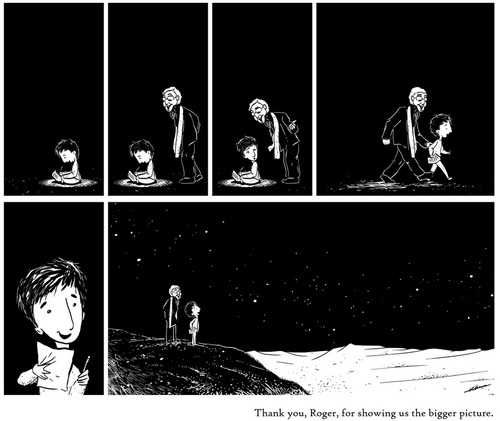
“But after I met him, I, surprisingly, admired the man more than the critic. What an awesome human being! He was so kind and caring, always listening, always watching. He knew he had the power to touch people’s lives, and he did so as often as he could, and with such humbleness. For instance, what need did this man have to give people around the world a chance to speak up, on his blog?
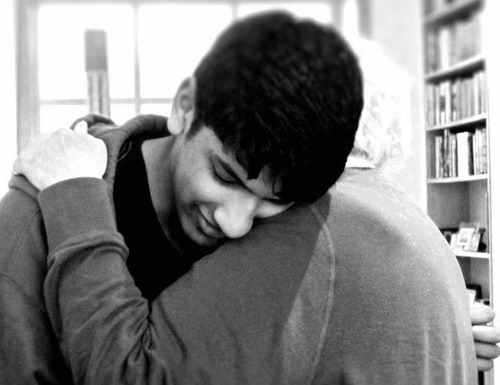
“What need did he have to contact me, saying he “liked your mind and style”? He did it as a simple act of kindness, but it profoundly changed my life. But “my Ebert story” is one for an other day. Today, I don’t feel like it. In a nutshell, with his infinite kindness and generosity, he changed my life in more ways than anyone will ever know.
“He was the only person who made me feel good about being myself.”
— Krishna Shenoi, Far-Flung Correspondent
“Of the entries included on the [Microsoft Cinemania CD-ROM] disc, the ones by Roger were the longest and most detailed. Maltin wrote capsules and Kael’s pieces were the edited-down versions of her ‘New Yorker’ reviews, originally contained in ‘5001 Nights at the Movies.’ Roger’s prose was instantly accessible and inviting. He seemed uninterested in infallibility (something Kael would thrive on, clearly having enjoyed publishing what she saw as final words on her subjects). He came off as a super-knowledgeable guy who happened to want to simply talk movies with you. He would never judge you for botching a phrase in English, I thought to myself — only for being untrue to your gut feeling. I took immediate comfort in that; one that later allowed me to make my own tentative attempts of writing criticism in English.”
— Michał Oleszczyk, Far-Flung Correspondent, Krakow, Poland
ldquo;On one of their many lively talk show appearances during that era, Gene paused in between trading playful barbs to confess that what he envied most about Roger was his writing ability. Gene was right: Ebert was better. And whether he was reviewing Cries and Whispers for the Sun-Times or jousting with cinephiles on CompuServe, the agility of his prose was the same. Many writers have linked Roger’s loss of his voice with his use of the Internet, probably because Roger made the connection many times himself. But he had created his own virtual forum at least as early as 1995 or 1996, a pioneer in online criticism and communication. I joined CompuServe briefly around then. Sparring directly with Ebert was fun. With the proto-trolls who prowled the forum spouting venom and lunacy, not so much. After a few months I wrote Roger an email, politely telling him that I was leaving. Unexpectedly he replied: ‘I’ll miss you!’ He added that there was ‘a lot of silliness’ online, but that he also found enough value in the virtual realm to stick around.”
— Craig Simpson, The Man from Porlock
“The irony is that it all feels so personally sad. It feels so personally, profoundly awful and unfair, and I feel it with the grief nerves, not just the admiration nerves, because people whose books you destroy from overuse as a 16-year-old, you will grieve when they die as if you knew them, whether they are novelists or critics. But still, after all that, I was doing all right until I remembered that he’s not going to write about any more movies. And I’m still not ready for that.”
— Linda Holmes, NPR
“Because I was 19, I took this as an invitation to keep bothering Ebert, and over the next two years, I emailed him regularly, with questions about my career, with movie reviews I’d written and hoped he would offer tips on, with requests for advice on writing, on life, on the tough job market that awaited me upon graduation. Ebert wrote back to every single one, with lengthy and heartfelt missives that were far more than a snot-nosed kid clearly getting off on Knowing Roger Ebert deserved. I have no idea why he did it. He told me ‘that this is important to you as it is, that’s a very large percentage of what you need, really.’ He emphasized that such ephemera like ‘career’ and ‘success’ were mostly beside the point. ‘Just write, get better, keep writing, keep getting better. It’s the only thing you can control.’”
— Will Leitch, Deadspin
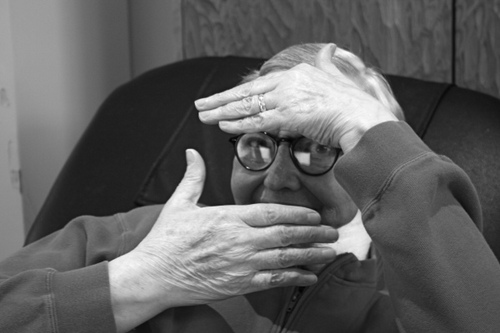
“Dear Roger:
“I’m not going to pretend that we were close; nonetheless, you were my friend. You were generous and supportive, and I never properly expressed to you how much your generosity and support meant to me. You were the only person I’ve ever asked for advice.
“When I learned that you’d died, I had just filed a review for you website. I was about to start wrapping up one for this site — a pan of ‘Simon Killer.’ I no longer feel like working on that review. I don’t feel like writing about bad movies at all. I want to write about good movies and good people.”
— Ignatiy Vishnevetsky, “Ebert Presents At the Movies,” MUBI.com
“Roger would have told me to stop fretting and start writing. After hearing the terribly sad news of the passing of my writing hero, my friend, my television partner, I sat at the keyboard and tried to come up with the perfect lead to sum up my feelings about Roger Ebert’s death.”
— Richard Roeper, Chicago Sun-Times, Ebert & Roeper
Roger reads Mike Royko’s review of “Beyond the Valley of the Dolls”:
“It’s been five days since the world found out about Roger Ebert’s death. Writers have been competing in the eloquence of their tributes, and even though I am not one to judge the particular way a person mourns, I have found certain aspects of this deluge rather off-putting. I simply think it an incongruent way to mourn the death and celebrate the life of a man who despised cant and abhorred schmaltz (though he enjoyed having fawning admirers)… Roger knew the meaning of the phrase “too much of a good thing.” He was a measured man, who kept things simple. He loved the movies, he loved his wife, he loved his family, and he loved his friends. He was a kind and generous soul, who lived a full and happy life. He will be missed. Every day. /eom”
— Ali Arikan, Far-Flung Correspondent, Dipnot.tv, PressPlay
“Roger believed fervently in standing up, especially when it came to workers’ rights. Back in the ’80s, during the height of the politically reactionary Reagan era, he would proudly identify himself as a ‘card-carrying member of SDS.’ (Not sure, though, whether Roger hewed to the original Port Huron statement, or ‘the compromised second draft,’ as the Dude dismissed it in ‘The Big Lebowski.’)
“His union sympathies began at an early age. His father, Walter, worked as an electrician, and Roger remained a member of the Newspaper Guild throughout his career — though after he became an independent contractor, he probably could have opted out. He famously stood with the Guild in 2004, when he wrote to then publisher John Cruickshank that ‘it would be with a heavy heart that I would go on strike against my beloved Sun-Times, but strike I will if a strike is called.’”
— Laura Emerick, Roger's Chicago Sun-Times editor
“It would not be a stretch to say that Mr. Ebert was the best-known film reviewer of his generation, and one of the most trusted. The force and grace of his opinions propelled film criticism into the mainstream of American culture. Not only did he advise moviegoers about what to see, but also how to think about what they saw.”
— New York Times, obit
“I’ve long believed that the job of the daily reviewer is a very tough one. Ebert writes, in the introduction to his 2006 anthology of his work, ‘Awake in the Dark,’ of seeing ‘three movies during a routine workday,’ and, according to Douglas Martin’s obituary in the Times, Ebert ‘said he saw 500 films a year and reviewed half of them.’ Some movies elicit passionate exultation; others, passionate revulsion. Those movies that repel you are the hardest to write about, and, for many critics, that’s the majority of movies. That’s where Ebert’s unique temperament, his humanistic world view, comes into play.”
— Richard Brody, The Front Row
“But his death should not be taken as yet another occasion to lament the decline of movies or the decay of movie criticism. The day before he died, Roger announced that he was taking a ‘leave of presence’ necessitated by the reappearance of his cancer, and even though the message was a farewell, it was also full of plans for the future: the redesign of his Web site; the kick-start of the latest iteration of his television show; the refocusing of his energies on the films he most wanted to write about.”
— A.O. Scott, New York Times
A video remembrance from Nelson Carvajal:
“… [Friends] called to express their sympathies: ‘It’s like Ebert stuck two thumbs up your ass and then had a tug of war with himself.’”
— Alan Zweibel, , author and co-screenwriter of “North”
“I noticed how much Ebert could put across in a limited space. He didn’t waste time clearing his throat. ‘They meet for the first time when she is in her front yard practicing baton-twirling,’ begins his review of ‘Badlands.’ Often, he managed to smuggle the basics of the plot into a larger thesis about the movie, so that you don’t notice the exposition taking place: ‘“Broadcast News” is as knowledgeable about the TV news-gathering process as any movie ever made, but it also has insights into the more personal matter of how people use high-pressure jobs as a way of avoiding time alone with themselves.’ The reviews start off in all different ways, sometimes with personal confessions, sometimes with sweeping statements. One way or another, he pulls you in. When he feels strongly, he can bang his fist in an impressive way. His review of ‘Apocalypse Now’ ends thus: ‘The whole huge grand mystery of the world, so terrible, so beautiful, seems to hang in the balance.’”
— Alex Ross, The New Yorker
“The more Roger became a prisoner of his body, the more he seemed to escape into his rich and sophisticated mind. By the agreement of almost everyone I know, his writing in these last years was among the best he’d ever done, more personal and expansive, marked by a still-astonishing rate of productivity. He wrote a wonderful memoir, close in its deceptively profound, plainspoken way to two of the writers Roger most admired: Charles Dickens and Samuel Johnson. And indeed, Roger was nothing if not an Anglophile: Among the least known books he authored is a slender volume called ‘The Perfect London Walk,’ an instructional travel book that, having taken the journey it maps, I can assure you is a rare case of truth in titling.”
— Scott Foundas, Variety
“I started this blog in May, and it has enriched my life. I have been astonished by the high quality of the comments received. I have also been educated, amused, moved, corrected, encouraged. I personally read all the comments that are submitted, and after four months I have received not one obscene message, not one illiterate message, not one hostile message. Those few comments I have not published were not dumb or offensive, but simply things like well-wishes that I didn’t think most readers would be interested in.
“Your comments have provided me with the best idea of my readers that I have ever had, and you are the readers I have dreamed of. I was writing to you before I was sure you were there. You are thoughtful, engaged, fair, and often the authors of eloquent prose. You take the time to craft comments of hundreds of words. Frequently you are experts, and generous enough to share your knowledge.”
— Roger remembers, how he fell in love with blogging
“Even with his illness he continued to write. And the writing (and how much of it there is to read!) is what will keep Ebert a titan, alongside Pauline Kael and Andrew Sarris, who died last June. Ebert worked in a separate realm (and city) from Kael’s and Sarris’s rivalries and coteries and seemingly endless word counts. In print, Ebert practiced criticism with vivid clarity. A writer I know once told me he didn’t read Ebert because he get could a plot summary anywhere. It’s true that a typical Ebert review contains mostly plot synopsis, but it’s mostly plot synopsis the way diamonds are mostly coal.”
— Wesley Morris, Grantland
“In honor of Roger Ebert’s immense, diverse body of work, here are fifteen great quotes and passages from his writing — from pans to effusive praise to touching blog posts and even recipes. These aren’t necessarily his most definitive reviews or passages, and yet each one evokes exactly what he did so well in every bit of writing, no matter how banal, grand, or universal the subject.”
— Bilge Ebiri, Vulture.com: “15 Roger Ebert Passages That Epitomize His Writing”
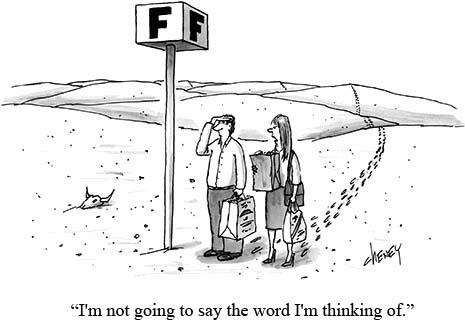
— Bob Mankoff, The New Yorker — Best of Ebert's Cartoon Contest Captions
“As a friend, Roger would send quick and clever emails in conspiratorial tones and longer ones that were warm and encouraging. I’ve never had an actual conversation with Roger, because cancer sadly claimed his ability to speak before our paths crossed; instead, he knew how to convey a sense of connection with a genuine, direct look in his eyes. […]
“Once he was no longer able to speak, he turned his blog into an outpouring of musings on every topic imaginable, from alcoholism to atheism. In some ways, I actually enjoyed his writings on subjects outside of film even more. They reflected a curiosity, a yearning to be a citizen of the world rather than just a big fish in a particular pond.”
— Christy Lemire, Associated Press, “Ebert Presents At the Movies”
“But I still have him in the form of the finest and highest standard of what it means to be a journalist and critic. All my life, Roger Ebert has always been the bar I’ve tried to reach. I never will. But his example has made me stronger through failure.”
— Andy Ihnatko, Sun-Times tech columnist
“Roger took me on from just about the start of my career on the internet, 15 years ago. He used to be the star writer for Yahoo! Internet Life. The Hot Button, as it once was known, and roughcut.com, as it once existed, got a lot of praise from him on those pages. He called my column ‘gossip of the highest order’ and that compliment stuck in my craw for… well, it still does. It still comes to mind more often than I wish it would.
“As we developed more of a relationship, it got more complicated. I can’t say we were close. There was always an arms length. But there was always a big smile and a hug from Chaz and a moment taken from his busy schedule. A few minutes at TIFF the first year he returned after his throat surgery … he wasn’t being brave … he was living. No giving up. And professionally, he was very generous with me.”
— David Poland, Movie City News
“‘Most Americans don’t understand the First Amendment, don’t understand the idea of freedom of speech, and don’t understand that it’s the responsibility of the citizen to speak out,’ he said. […]
He also defended his own right to speak out:
“I write op-ed columns for the Chicago Sun-Times, and people send me e-mails saying, ‘You’re a movie critic. You don’t know anything about politics.’ Well, you know what, I’m 60 years old, and I’ve been interested in politics since I was on my daddy’s knee… I know a lot about politics.’”
— Matthew Rothschild, The Progressive
“Roger has immensely influenced me since I got acquainted with him through his reviews, and he taught me a lot about how I should think and analyze movies. As a guy diagnosed with Asperger’s Syndrome, movies came to me as the useful tool for communication, and I have tried to communicate with others through good movies and my reviews written about them. Roger showed me the good examples of how to do that…”
— Seyongyong Cho, Far-Flung Correspondent (Seoul, South Korea)
Roger addresses the question: “In facing your own mortality, what final message would you leave for future generations?” — CPT12, Colorado Public Television
“But then came the cancer, the removal of his jaw, the loss of his ability to eat (which he loved) and hold forth (which he loved as much). But this cursed event was in some respects a gift. As a film blogger, he was peerless, and he was, if anything, better on politics and social issues than on movies. On Twitter, he found the kind of direct line to the public he’d never had before. He loved the community, the interchanges both respectful and feisty, the instant feedback. What an irony: Lacking the power of his speech, he was still in his element.”
— David Edelstein, New York Magazine
“… Roger is known for fighting for people that don’t have a voice. That’s why he’s so loved and will be missed by so many millions of people.”
— Darryl Roberts, director of “America the Beautiful”
“I’m tempted to say that if Roger had never written a word, he’d be known for bringing people together. But the writing was what made Roger Roger. He wasn’t just generous with those close to him. He told everyone a lot about himself — sometimes, I think, more than he knew — in the words he published: his reviews, his op-ed pieces, his interviews, his blog, his memoir — even his tweets.”
— Jim Emerson, RogerEbert.com, Scanners
“Did I mention he was a film critic?
“Well, who you are is and isn’t what you officially do for a living. Ebert wasn’t working so hard to prove a point. He worked so hard because that’s who he was. Writing was like breathing to him.
“No wonder this Champaign-Urbana transplant was the quintessential Chicagoan. We like to think of Chicago as the city that gets things done.
“Ebert got things done. He got a whole hell of a lot of things done.”
— Mark Caro, Chicago Tribune
“‘Start writing. Short sentences. Describe it. Just describe it.”
“Roger said, when I asked him about writer’s block. Then he quoted the first three paragraphs of his ‘Persona’ review and told me that it had completely baffled him in 1967 but this strategy worked brilliantly. Tonight, as I sit here numbly staring at the screen with the hardest writer’s block I’ve ever known, I place my fingers on the keyboard to follow the advice of the greatest man I know, and just describe it.”
— Grace Wang, Far-Flung Correspondent